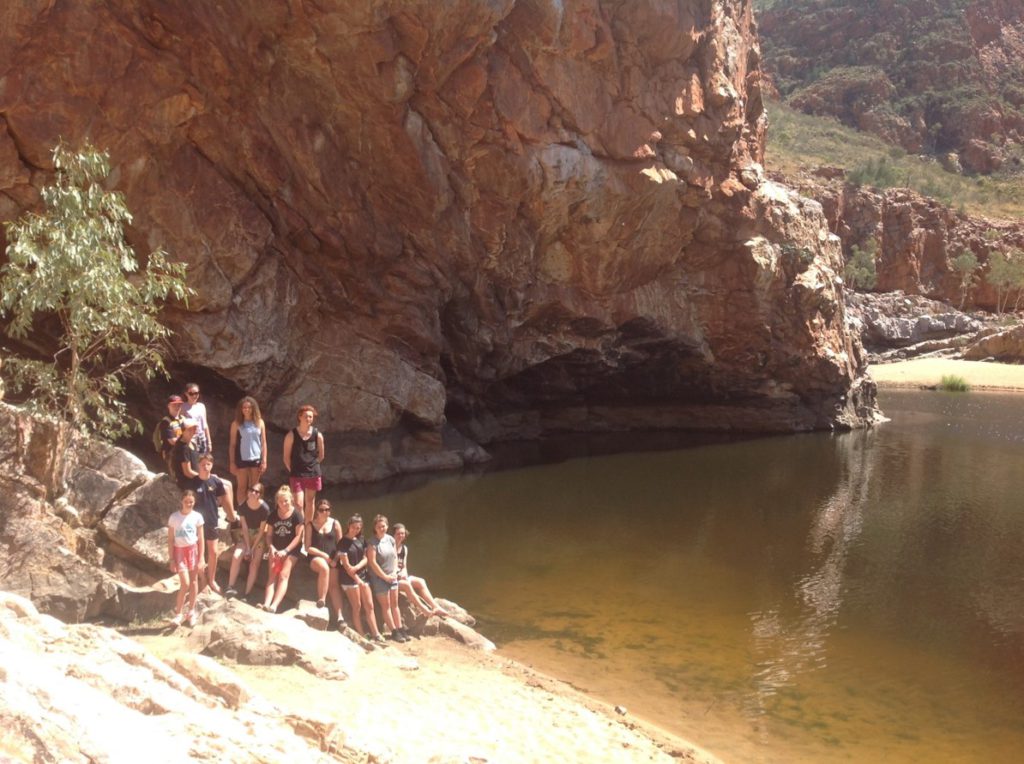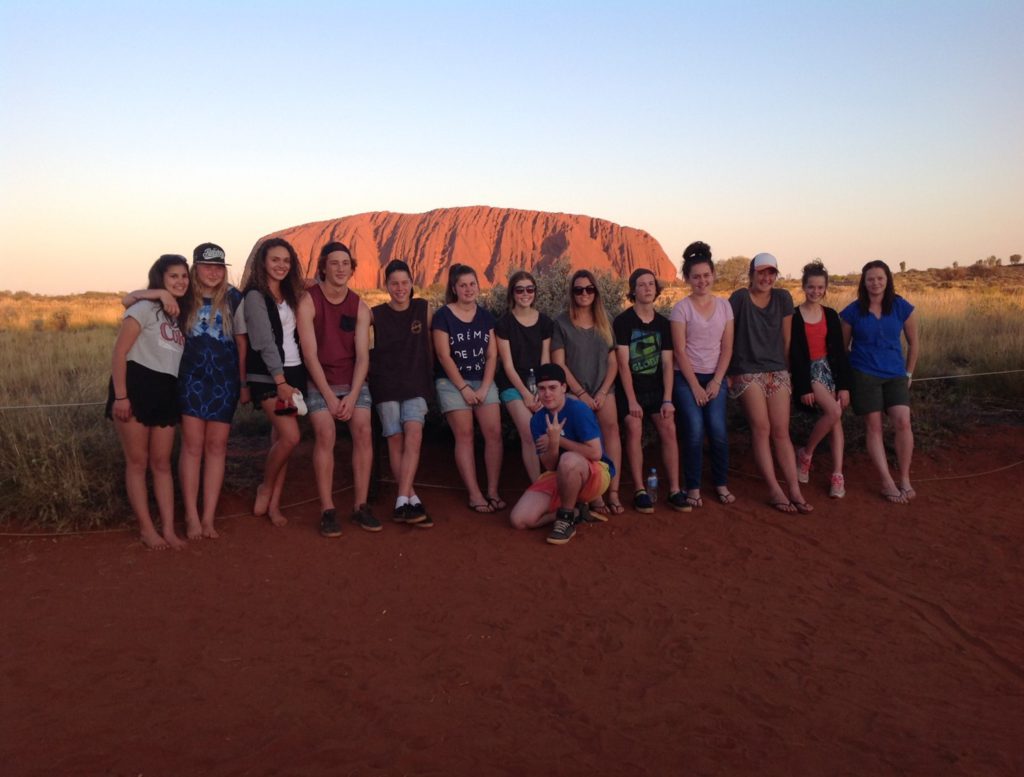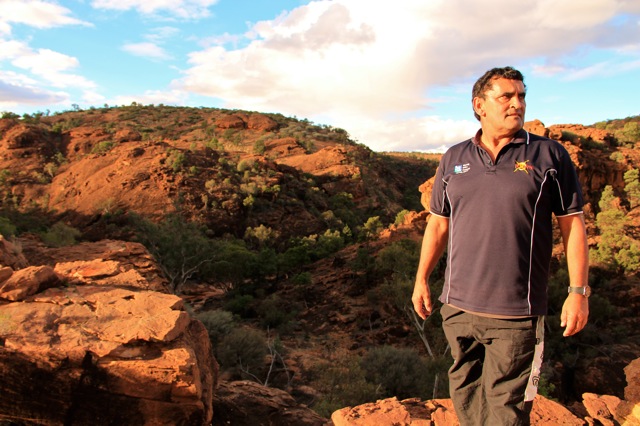Britannica is honouring NAIDOC Week through a series of conversations with inspiring Aboriginal and Torres Strait Islander men and women, whose ideas, skills, commitment and contributions have led to the betterment of our students, schools and communities.
We find out about their incredible work as well as the personal passions, triumphs and journeys that led them to where they are today.
Please note: Aboriginal and Torres Strait Islander people should be aware that this website may contain images, voices or names of deceased persons in photographs, film, audio recordings or printed material.
David Ella, the Education Officer Aboriginal Education for the Diocese of Broken Bay, is leading Spiritual Pilgrimages across Australia to help his Aboriginal students improve learning and career outcomes, while gaining a deeper understanding of their cultural and spiritual identities.
Can you tell us about your role as an “Education Officer Aboriginal Education for Education?” What does the position entail and how did you come into it?
My present role is the Education Officer Aboriginal Education for the Diocese of Broken Bay, my traditional roots lie with the Yuin people from South Coast. My family grew up in the Aboriginal community at La Perouse where my family instilled in me a strong sense of my Aboriginal identity & culture.
The sea is a big part of my existence; we are called salt water people. To me I believe that our Catholic spirituality also sees land and the sea as being sacred and as revelations of God in the world. There is therefore a beautiful connection between Aboriginal and Catholic spiritualities, which may only be made with the intention of offering respect to Aboriginal beliefs and cultures.
My position is Education Officer – Curriculum, Teaching and Learning K – 12 Aboriginal Education. My main role is to provide advice, expertise and practical support for curriculum, teaching and learning K-12 and the management of intervention and support structures for Aboriginal and Torres Strait Islander students K-12 (in collaboration with school leaders). I also provide support for teachers across the curriculum to promote Reconciliation and to support their understanding of Indigenous cultures, spirituality, experience and history.
In this role, I oversee the effective implementation of systems, policy and guidelines pertaining to Aboriginal education, leading to a higher quality education for every Aboriginal student in the Diocesan School System, this is reflected through continually improving retention and achievement measures. For example, informed management of resources which leads to improved educational outcomes for Aboriginal students by gathering, analysing, and reporting on data, identifying the educational and pastoral care needs of Aboriginal students and their families and advocating on their behalf promoting understandings of Aboriginal spirituality and appropriate cultural protocols supporting students & parents who identify as Aboriginal within the school and the wider community.
There is therefore a beautiful connection between Aboriginal and Catholic spiritualities, which may only be made with the intention of offering respect to Aboriginal beliefs and cultures.
Can you share some of your experiences from the “Aboriginal Spiritual Pilgrimages” you have undertaken with students?
The Aboriginal Spiritual Pilgrimage has been designed to challenge Aboriginal students in the following ways:
- To improve their educational and career pathway.
- To gain knowledge and respect for Aboriginal spirituality protocols.
- To gain a better understanding of their own Aboriginal identity, culture and values.
- To promote an understanding of how Aboriginal Spirituality marries into our Catholic beliefs.

Students on the Spiritual Pilgrimage will visit sacred Aboriginal sites as well as engaging with local Aboriginal people from the communities we will visit. This will raise the Aboriginal student’s awareness and understanding of everyday life of Aboriginal people living in remote communities across Australia. This engagement will give our students the abilities and skills required to approach new challenges in their own cultural identity and support their educational and career pathway.
The Pilgrimage will also provide a structure for students to experience different learning styles by identifying and undertaking personal and leadership challenges. It will provide students with the knowledge, skills and attitudes to bring about cultural transformational change in their school, home and work place.

What do you see as the most important issue/s faced by educators today?
A Quality Learning Environment with explicit quality criteria with the engagement of Aboriginal parents working in partnership to aim for high expectations for Aboriginal students. All educators must value, respect and appreciate Aboriginal culture and support student identity as an intrinsic part of each school community’s culture. Developing genuine partnerships and engagement with Aboriginal parents and the local community to support quality teaching practices to better engage Aboriginal students.
We have to provide opportunities on a regular basis to continue strengthening the rapport between the school and community. A strong focus on professional development for all staff about local Aboriginal history to support a school culture which promotes respect for, and understanding of local Aboriginal culture.
This will be achieved through;
- Pedagogical leadership & teaching practices
- Building teacher and school leadership capacity to support school improvement and Aboriginal student learning.
- Quality teaching practices used for every Aboriginal student with particular attention to Personalised Learning Plans in partnership with the Aboriginal community to support a school’s culture and practice that respects and responds to every Aboriginal student’s aspirations, culture and learning potential.
We must encourage every senior leader within education from the Ministers down to School Principals to be personally held accountable for the educational outcomes for Aboriginal students.
More Educator Resources
Sign up with your email for more free resources from Britannica.
NAIDOC Week is a chance for Australians to come together in recognition of the history, cultures, voices and achievements of Aboriginal and Torres Strait Islander people. The event takes place from every second Sunday of July through to the following Sunday.
Other Learning Resources for NAIDOC Week
NAIDOC Week Activities – Britannica School
Celebrate NAIDOC Week with Britannica Library

